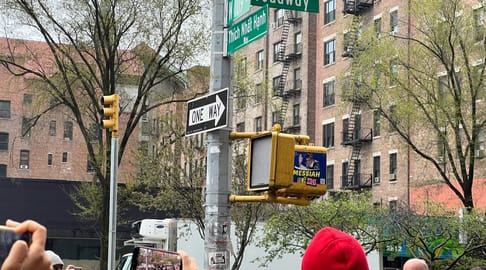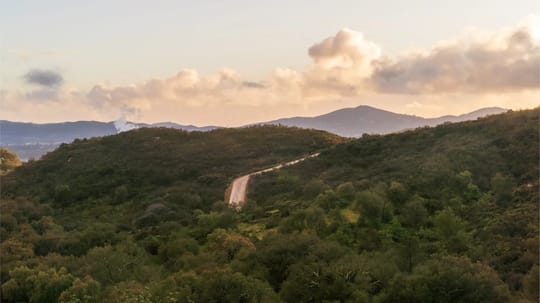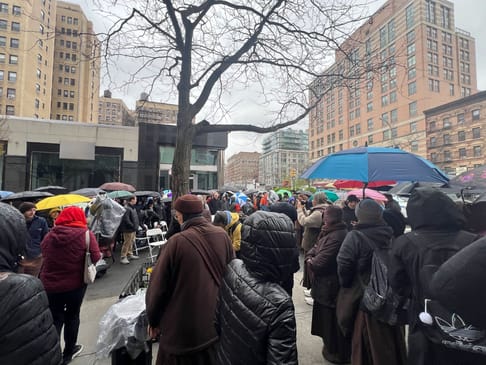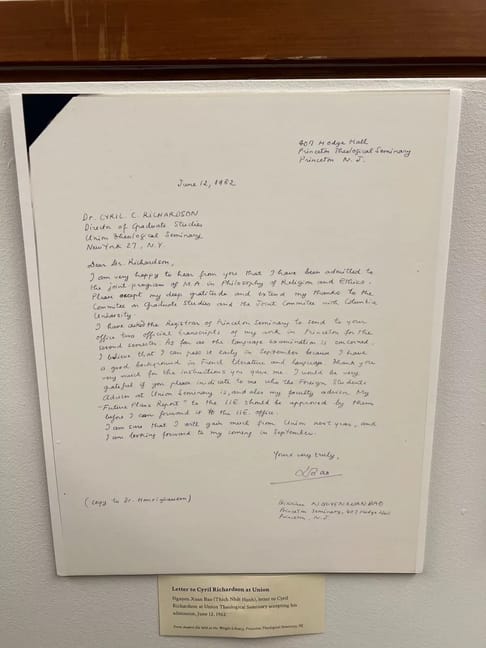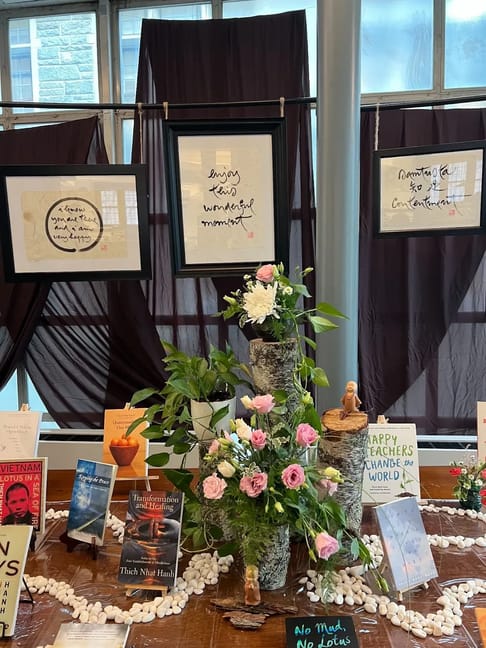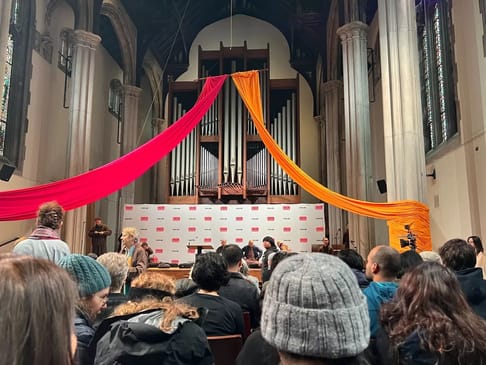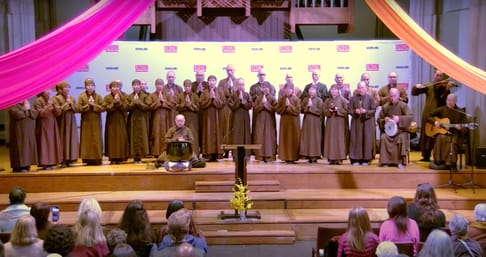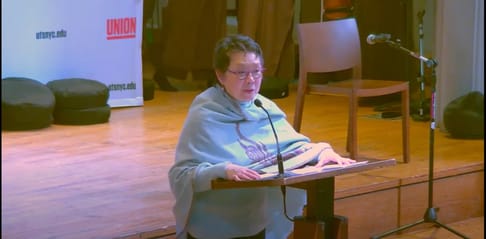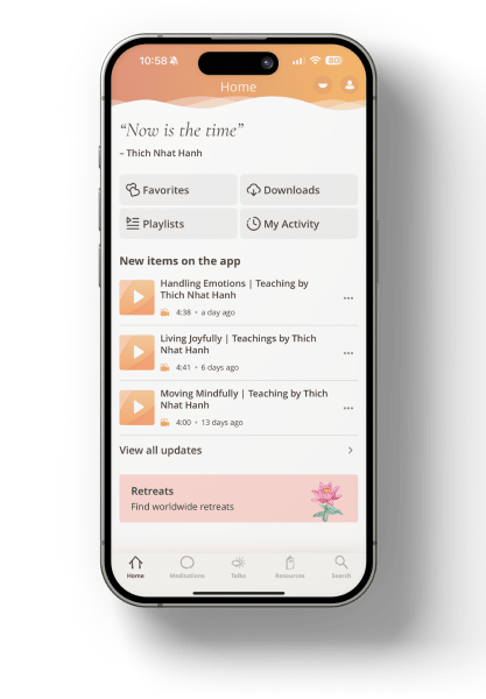New York City, April 11, 2025 – In the gentle spring drizzle and slightly chilly weather, New York City officially inaugurated “Thích Nhất Hạnh Way” at the intersection of Broadway and West 109th Street, honoring the globally revered Zen master Thích Nhất Hạnh. A Vietnamese poet, author, monk, and peace activist, Thích Nhất Hạnh is widely recognized as the “father of mindfulness” for introducing the practice to the West and inspiring millions through his teachings on engaged Buddhism and mindful living.
Participants gather at the unveiling of “Thích Nhất Hạnh Way” in New York City, April 11, 2025. A Meaningful Spring Day
Despite the cold temperatures, hundreds gathered at the intersection of West 109th Street and Broadway, just steps away from 306 West 109th, where Thích Nhất Hạnh shared a fifth-floor studio in 1962-1963 with his former roommate and fellow student, now Reverend Stephen Headley. The participants included monastics from Blue Cliff Monastery in New York, Deer Park Monastery in California, lay practitioners from Plum Village-affiliated communities in the New York area, and supporters from across the country, with some traveling from as far as California and Vietnam. To accommodate the ceremony, the NYPD closed off a section of West 109th Street near Broadway. The street sign, shrouded in a paper sleeve and tied with a ceremonial cord, stood ready for unveiling. Dozens of white chairs were arranged for special guests, while the rest of the community formed a large circle around them. The atmosphere was joyful and celebratory—filled with warm smiles, embraces, and moments of quiet reflection.
A Joyful Naming Ceremony
The ceremony began at 11:30 AM with opening remarks by Brother Pháp Lưu, a longtime disciple of Thích Nhất Hạnh and senior monk at Deer Park Monastery. He expressed gratitude to the sponsors and supporters whose tireless efforts—gathering signatures, submitting petitions, and navigating the approval process—made the co-naming initiative possible. New York City Council Member Shaun Abreu then delivered a speech recognizing Thích Nhất Hạnh’s contributions to the global mindfulness and peace movements, and shared that the initiative had received unanimous approval from the council. Following his remarks, Brother Pháp Không, representing the monastic community at Blue Cliff Monastery, offered reflections encouraging the public to honor Thầy’s legacy by living mindfully and peacefully. Mr. Abreu then led the crowd in two countdowns before unveiling the street sign. Participants responded with joyful songs, including “I Have Arrived, I Am Home” and “Please Call Me by My True Names,” filling the air with gratitude and joy. Ms. Thủy Đỗ, a lay dharma teacher who traveled from Garden Grove, California to attend the ceremony, remarked: “If one truly cherishes the journey of Thầy from the Plum Village tradition, they will undoubtedly be moved and deeply value the street-naming event on April 11. Thầy’s life was profoundly connected to New York—not only through his teaching mission but also through his engaged actions, advocating for peace and human rights.”
The newly unveiled “Thích Nhất Hạnh Way” sign at West 109th and Broadway, surrounded by joyful monastics and attendees capturing the moment. Mindful Walking and Calligraphy Exhibition
Following the street naming, Brother Pháp Tuyển from Blue Cliff Monastery offered guidance on walking meditation, a core mindfulness practice introduced by Thích Nhất Hạnh. Practitioners were invited to walk slowly and attentively, synchronizing each step with their breath. From the corner of West 109th and Broadway Street, the group moved mindfully along Riverside Drive toward the Burke Library at Union Theological Seminary. The east bank of the Hudson River, awash in vibrant spring blossoms, offered a tranquil backdrop to the mindful procession. The sight of hundreds walking silently and deliberately formed a powerful contrast to the usual rush of Manhattan streets.
A 1962 letter from Thích Nhất Hạnh (then Nguyễn Xuân Bảo) accepting admission to Union Theological Seminary Once the crowd reached the Burke Library, they were invited into a small but beautifully curated exhibition featuring Thích Nhất Hạnh’s calligraphy, writings, and archived materials from Columbia University. The exhibition took place in two intimate rooms lined with windows overlooking a courtyard bright with spring blossoms. Original calligraphy pieces were thoughtfully displayed on fabric panels in the warm brown hue of his monastic robe. Phrases such as “Peace in oneself, peace in the world” and “Enjoy this wonderful moment” served as gentle reminders of Thầy’s teachings. Tables throughout the space were filled with his books, ranging from the classic “The Miracle of Mindfulness” to more recent works like “At Home in the World,” accented by elegant flower arrangements, creating an atmosphere both scholarly and serene. It was a quiet yet powerful moment of reflection. One could not help but contemplate how far the young novice Phùng Xuân had come—from his humble village in Nông Cống, Thanh Hóa in central Vietnam to the Ivy League halls of Columbia University—and how he would go on to become one of the most influential spiritual leaders of our time.
A serene display from the calligraphy and book exhibition at Burke Library Program at James Chapel
The afternoon program at James Chapel began with mindful eating, a practice pioneered by Thầy, as his students affectionately call him. James Chapel is an intimate worship space featuring high classical columns, elegant Tiffany glass windows, a beautifully detailed organ, and wooden pews. Two large pieces of fabric in warm red and orange hues were gracefully wrapped around a pair of front columns, lending a vibrant yet reverent energy to the setting. Participants collected their lunches—Vietnamese vegan bánh mì thoughtfully prepared and served in paper containers —and took their seats in the chapel’s sanctuary chairs. Sitting with his monastic siblings on the chancel, Brother Pháp Xả from the European Institute of Applied Buddhism (EIAB) gently guided the community to enjoy their meal in silence, savoring each bite slowly while being mindful of the many conditions that made the meal possible. For many, this moment of quiet presence offered a welcome and nourishing pause from the rushed, distracted meals so common in everyday life.
James Chapel’s interior, with red and orange fabric banners After the meal, Sister Hoa Nghiêm from Blue Cliff Monastery introduced the audience to the chanting of the name of Avalokiteshvara Bodhisattva, the bodhisattva of compassionate listening, led by the monastics. The invocation was a solemn prayer offered for the victims of war, natural disasters, injustice, and oppression around the world.
Monastics chanting of the name of Avalokiteshvara Bodhisattva Several speakers followed after the chanting. Mrs. Su Yon Pak, Dean of Union Theological Seminary, spoke thoughtfully about Thích Nhất Hạnh’s profound influence on both spiritual seekers and academic institutions. Kosen Greg Snyder, Senior Director and Assistant Professor of Buddhist Studies at Union, reflected on the Zen master’s enduring legacy and the inspiration behind the school’s Engaged Buddhism Program, which proudly bears his name.
Mrs. Su Yon Pak, Dean of Union Theological Seminary Brother Pháp Lưu and Sister Thệ Nghiêm shared reflections on Thầy’s life and teachings, highlighting his work on engaged Buddhism, ethical conduct, and peace activism, as well as the central role of community building in his vision. They recounted his early efforts to unify the Vietnamese Buddhist community and his later academic work at Princeton and Union Theological Seminary, which focused on Buddhist psychology and engaged Buddhism. Brother Pháp Lưu revealed a little-known chapter in Thầy’s life: a planned self-immolation in New York City to protest the war—an act he ultimately decided against. Thầy’s vision of a “beloved community” emphasized mindfulness, true brotherhood and sisterhood, and collective compassion. Sister Thệ Nghiêm emphasized that ethical conduct, as taught by Thầy, is not only a moral guideline but a practical path to well-being and a compassionate society, deeply rooted in mindfulness.
Event Conclusion
Brother Pháp Không, representing the Plum Village monastic community, offered tokens of appreciation to those who contributed to making the naming event possible. The afternoon program concluded at around four o’clock with a short guided sitting meditation led by Sister Thần Nghiêm from Deer Park Monastery, followed by a reading of Thầy’s poem “Please Call Me by My True Names” and a musical rendition of the same name adapted by Joseph Emet. The lyrics—”Please call me by my true names, so I can hear all my cries and laughter at once, so I can see that my joy and pain are one.”—echoed gently through the high vaulted ceiling of James Chapel. The monastic chorus closed the ceremony with a sense of reverence and calm, encapsulating Thầy’s timeless message of interbeing, compassion, and non-duality. Though celebratory in spirit, the full-day event was infused with mindfulness practices from beginning to end—just as Thầy would have wished. As he often reminded his students, “If you want to find me, look for me in your mindful breaths, your mindful steps.”
You can watch the afternoon program via the following YouTube Live recordings:
Thích Nhất Hạnh Way Co-Naming Ceremony – Part 1
Thích Nhất Hạnh Way Co-Naming Ceremony – Part 2
